#DWIHzeitgeist - Science Diplomacy in Practice
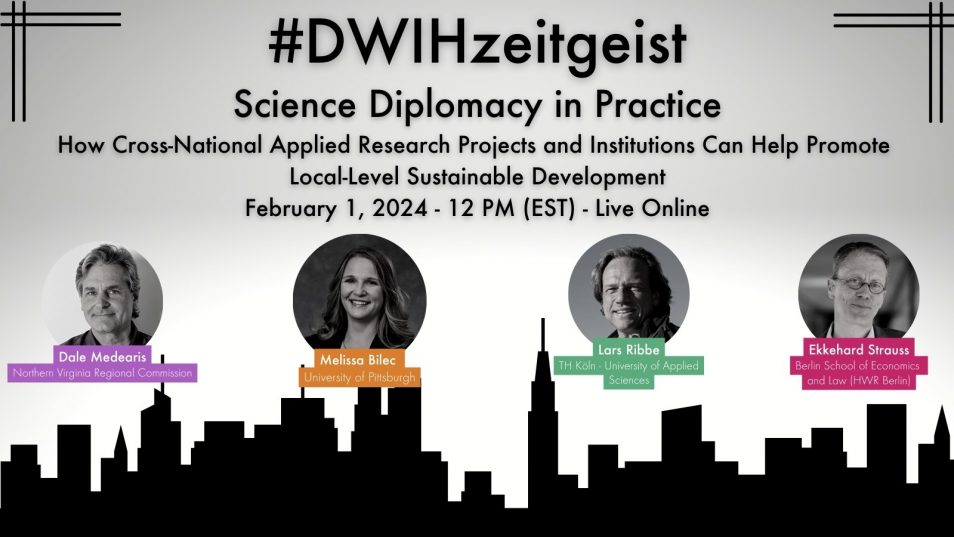 © DWIH New York
© DWIH New York
We were happy to welcome everyone to our #DWIHzeitgeist series event on February 1, 12 PM (EST) / 6 PM (CET) to learn about ways that science diplomacy plays out in Germany and the US.
Event Information
February 1, 2024, 12:00 PM to 1:15 PM
online
Organizer(s): DWIH New York, UAS7 - German Universities of Applied Sciences, American Friends of the Alexander von Humboldt Foundation, Berlin School of Economics and Law (HWR Berlin), TH Köln - University of Applied Sciences, University of Pittsburgh
Watch the Highlight Clip:

To play the video, click the thumbnail. Once activated data will be transmitted to the respective provider. Watch on YouTube
The full video recording can be accessed here.
Link to the interview with Ekkehard Strauss, one of the speakers.
The panel explored the relationship between science diplomacy and applied research on shared sustainability questions in Germany and the United States. The purpose of the event was to highlight various aspects of ways that science diplomacy plays out in Germany and the United States through cross-national applied research – especially in support of local level sustainability.
The panelists represented researchers, scientists and practitioners working with networks of local, national, international actors and institutions seeking to resolve global sustainability challenges. The panelists shared their experiences with international applied research projects, priority-setting, agenda development, resource allocation and the barriers or opportunities that they have experienced that affect or determine success.
The objective of this workshop was to illustrate how applied research projects play a crucial role in shaping both the theory and practice of science diplomacy. We seeked to enhance comprehension regarding the ways in which transdisciplinary projects contribute to addressing global challenges both presently and in the future.
Agenda
- Welcome Remarks
- Presentations and Moderated Discussion
- Q&A
Our Experts
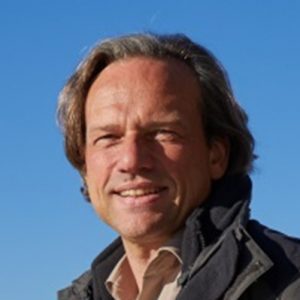
Lars Ribbe is a professor for integrated land and water resources management at the Institute for Technology and Resources Management in the Tropics and Subtropics (ITT), TH Köln-University of Applied Sciences, Faculty of Spatial Development and Infrastructure Systems serving as director of ITT 2009-2019 and since then as Dean of the Faculty. Holding degrees in chemistry, a Master of Engineering and a PhD in the field of Hydro-informatics (Geography) his current work in research and teaching focuses on assessment, modelling and management of water resources systems at different scales with the purpose of providing support for decision making towards water security and climate change adaptation. For this end, he is implementing concepts of Open Science and transdisciplinarity in research and innovation projects conducted in numerous countries in Africa, Asia, Latin America and Europe together with his research team consisting currently of 20 researchers at various academic levels. He has also been involved in consultancy projects of GIZ, UNDP and UNCCD. He supervised over 80 master theses, 17 PhD theses, published over 80 peer reviewed articles and book chapters. Furthermore, Prof. Ribbe co-designed a curriculum on Integrated Water Resources Management (IWRM) in 2008, which today is part of a network of MSc IWRM courses offered at universities in Vietnam, Jordan, Egypt, Costa Rica and Kosovo. He coordinates the international university network “Centres for Natural Resources and Development” with over 30 members since 2009 and initiated the international conference “Water Security and Climate Change” organised annually since 2016.Lars Ribbe, TH Köln-University of Applied Sciences
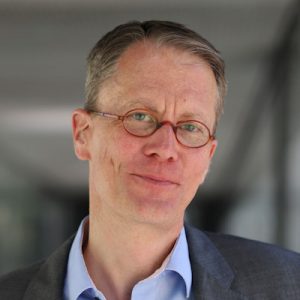
Ekkehard Strauss teaches and researches at the Berlin School of Economics and Law on the topics of police and security management, international human rights protection and international conflict management. Before being awarded the professorship, he worked for the OSCE and the UN for more than 20 years. His professional focus lays on assisting international organizations, governments, private companies and civil society in developing strategies, institutions and processes to monitor and respond to risk factors for crises, conflict and instability. Experience includes diverse geographic regions including North, West and Central Africa, the Middle East and Eastern Europe and the Balkans and headquarters in Geneva and New York. This geographical diversity has embraced countries in conflict, post conflict and peace building situations with different political and legal systems and cultures.Ekkehard Strauss, Berlin School of Economics and Law (HWR Berlin)
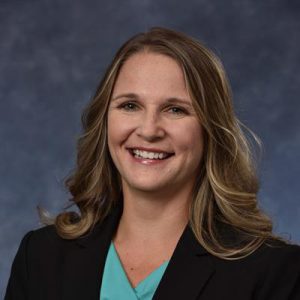
Melissa Bilec is the William Kepler Whiteford Professor in Civil and Environmental Engineering and Co-director of the Mascaro Center for Sustainable Innovation. Dr. Bilec has published 139 peer reviewed articles and secured $12 million in funding, including 15 National Science Foundation grants. Her research focuses on the sustainable built environment. She is committed to exploring how the built environment can be an integral part of climate change solutions. She views the world and her research using a systems-level approach, and she is an expert in life cycle assessment. Using this view, she integrates critical built environment modeling approaches from building energy modeling to indoor air quality to develop robust strategies to mitigate climate change and deleterious environmental and human health impacts. Most recently, she is working to solve the global waste challenge through the advancement and development of circular economy principles, since the built environment is a major consumer of resources and producer of waste.Melissa Bilec, University of Pittsburgh
Dr. Bilec is committed to diversity, inclusion, and equity. She is working to advance the issues around and the solutions to environmental justice in the City of Pittsburgh. Dr. Bilec is co-leading her department’s Inclusion, Diversity, Equity, and Access committee. She is also the co-faculty advisor for Pitt Society for Women Engineering. She was awarded the School of Engineering Diversity Award 2017-2018 and received Senior Vice Chancellor for Engagement’s Partnerships of Distinction award in 2019.
She has received four education excellence awards, and she developed the M.S. in Sustainable Engineering degree and co-developed a university-wide undergraduate certificate in sustainability. Dr. Bilec’s work prior to academia focused on green infrastructure projects, including the conversion of a 100-year hot metal bridge into a pedestrian bridge. She has two amazing kids, a supportive and hilarious partner, and two puppies that keep her active.
Moderated By
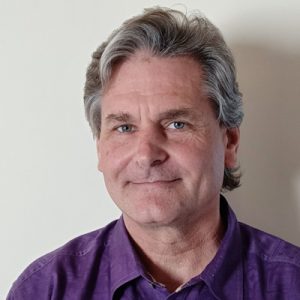
Since 2007, Dale Medearis has worked as a senior regional planner for the NVRC. He currently co-leads the NVRC’s regional climate mitigation, resiliency and international programs. Prior to working for NVRC, Dr. Medearis spent approximately 20 years at the Office of International Affairs, U.S. Environmental Protection Agency (EPA), in Washington, D. C. At EPA, he helped manage the Agency’s programs for urban sustainability, Eastern and Western Europe, the OECD, and Middle East. Medearis has a Ph.D. in Environmental Design and Planning from Virginia Tech University, an M.S. in Cartographic and Geographic Science from George Mason University, an M.G.A. in Government from the University of Pennsylvania, and a B.A. in International Relations from the University of Redlands.Dale Medearis, Senior Regional Planner, Northern Virginia Regional Commission
